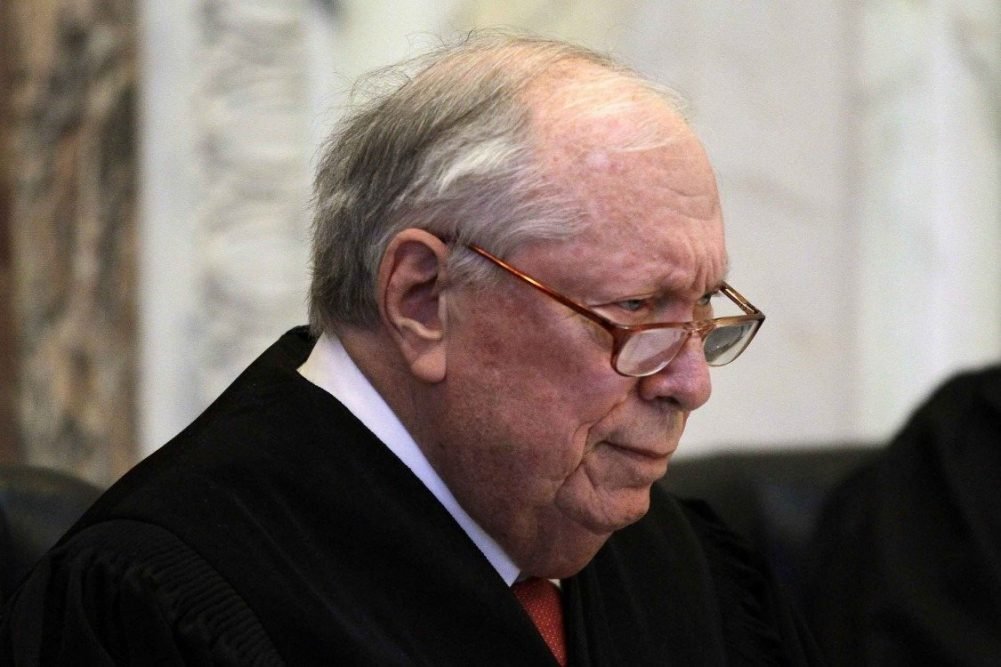A former law clerk to the late Judge Stephen Reinhardt, once a leading light of the federal judiciary, accused him of pervasive harassment and misconduct during stunning testimony before a House subcommittee Thursday morning.
Olivia Warren, who clerked for the judge from May 2017 until his death in March 2018, testified that Reinhardt regularly belittled her physique, scrutinized the physical appearance of female clerk applicants, and exhibited obsessive and paranoid behavior following the retirement of former Judge Alex Kozinski for workplace misconduct. Former President Jimmy Carter appointed Reinhardt to the 9th U.S. Circuit Court of Appeals in 1980.
“Judge Reinhardt routinely and frequently made disparaging statements about my physical appearance, my views about feminism and women’s rights, and my relationship with my husband, including our sexual relationship,” Warren said. “Often, these remarks included expressing surprise that I even had a husband because I was not a woman who any man would be attracted to.”
“I would like to emphasize that it is not my intention to destroy Judge Reinhardt’s legacy, to erase his significant contributions to the law, or to condemn him,” Warren said elsewhere in her testimony. “I was drawn to the practice of law by an interest in indigent defense work, and, especially as a capital defense attorney, I believe it is essential to see the enormous capacity for both good and bad in all people.”
Warren described a generally degrading work environment. She alleged that Reinhardt dedicated a particular shelf in his chambers to pictures of former clerks he found especially good-looking and asked her to evaluate photos from the social media accounts of two women applying to positions in his chambers. On one occasion, the judge allegedly drew two dots on top of a sine curve, such that the chart resembled breasts. He then asked Warren whether the image resembled her own breasts.
Follow LifeNews.com on Instagram for pro-life pictures and videos.
On other occasions, he questioned whether Warren’s husband could sustain an erection while looking at her.
As the Me Too movement developed, Warren said the atmosphere in Reinhardt’s chambers became increasingly tense. The judge was allegedly furious with the women who accused his longtime colleague Kozinski of sexual wrongdoing and repeatedly said he needed protection from Warren when the two were alone, lest she assault him sexually.
Clerkships with Reinhardt were highly coveted. Reinhardt was an audacious jurist one commentator styled “the last great liberal lion of a once-numerous pride.” As such, his chambers were attractive to aspiring academics and progressive cause lawyers like Warren. What’s more, many of his proteges went on to clerk at the Supreme Court.
Despite her accusations, Warren said she was reluctant to come forward for several reasons, among them the prospect of professional retribution. In particular, she feared well-placed former Reinhardt clerks would undermine her at some future date if she caused they shared mentor embarrassment.
“I was terrified of offending them; I still am,” Warren said. “I draw attention to this fact because it is yet another barrier to reporting harassment for law clerks — the possibility of immediate retaliation by the judge is supplemented by the possibility of long-term retaliation by those devoted to protecting his reputation and remaining in his good graces.”
She cautioned that she did not intend “to make a general statement about all Reinhardt clerks, or about all former law clerks.”
Reinhardt’s clerks make up an incredible roster of legal, political, and academic elites including former governors, federal judges, law school deans, and professors.
Chief Justice John Roberts ordered a review of “the safeguards currently in place within the judiciary to protect court employees, including law clerks, from wrongful conduct in the workplace,” in December 2017, not long after Kozinski’s abrupt departure.
Warren said reporting and disciplinary mechanisms in the federal judiciary remain insufficient to address wrongdoing, sentiments that watchdog groups echo.
House lawmakers sent a letter on Feb. 6 to several judges and judicial officials requesting additional information about disciplinary proceedings against U.S. District Judge Carlos Murguia. The letter said the response to Murguia’s misconduct “calls into question the adequacy of the judiciary’s recent steps to better protect its employees from wrongful workplace conduct.”
The Judicial Council of the 10th U.S. Circuit Court of Appeals publicly reprimanded Murguia for harassing court employees and carrying on an affair with a convicted felon that left him vulnerable to extortion. The council’s public findings do not disclose the full scope of his misconduct or remedial actions offered to victims of his misconduct.
“When a judge’s actions weaken the public’s faith in the judiciary, the remedy should not be kept secret from the public,” said Gabe Roth of Fix the Court, a nonpartisan judicial watchdog. “For the post-Kozinski misconduct rules to have any teeth, they should be applied transparently, assuming they’re being applied at all.”
LifeNews Note: Kevin Daley writes for Daily Caller. Content created by The Daily Caller News Foundation is available without charge to any eligible news publisher that can provide a large audience.

Please click here to read the full story.
Author: Kevin Daley




